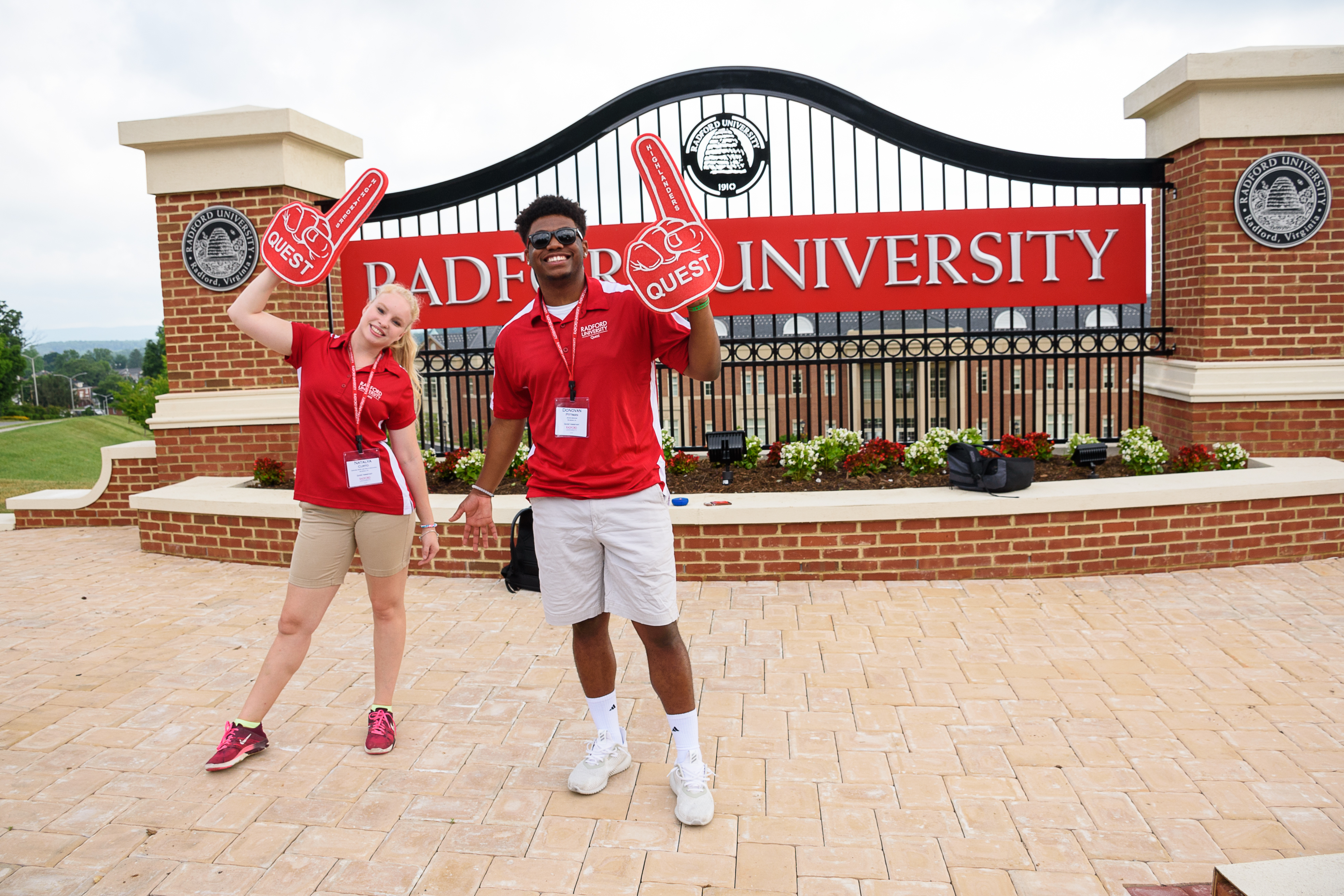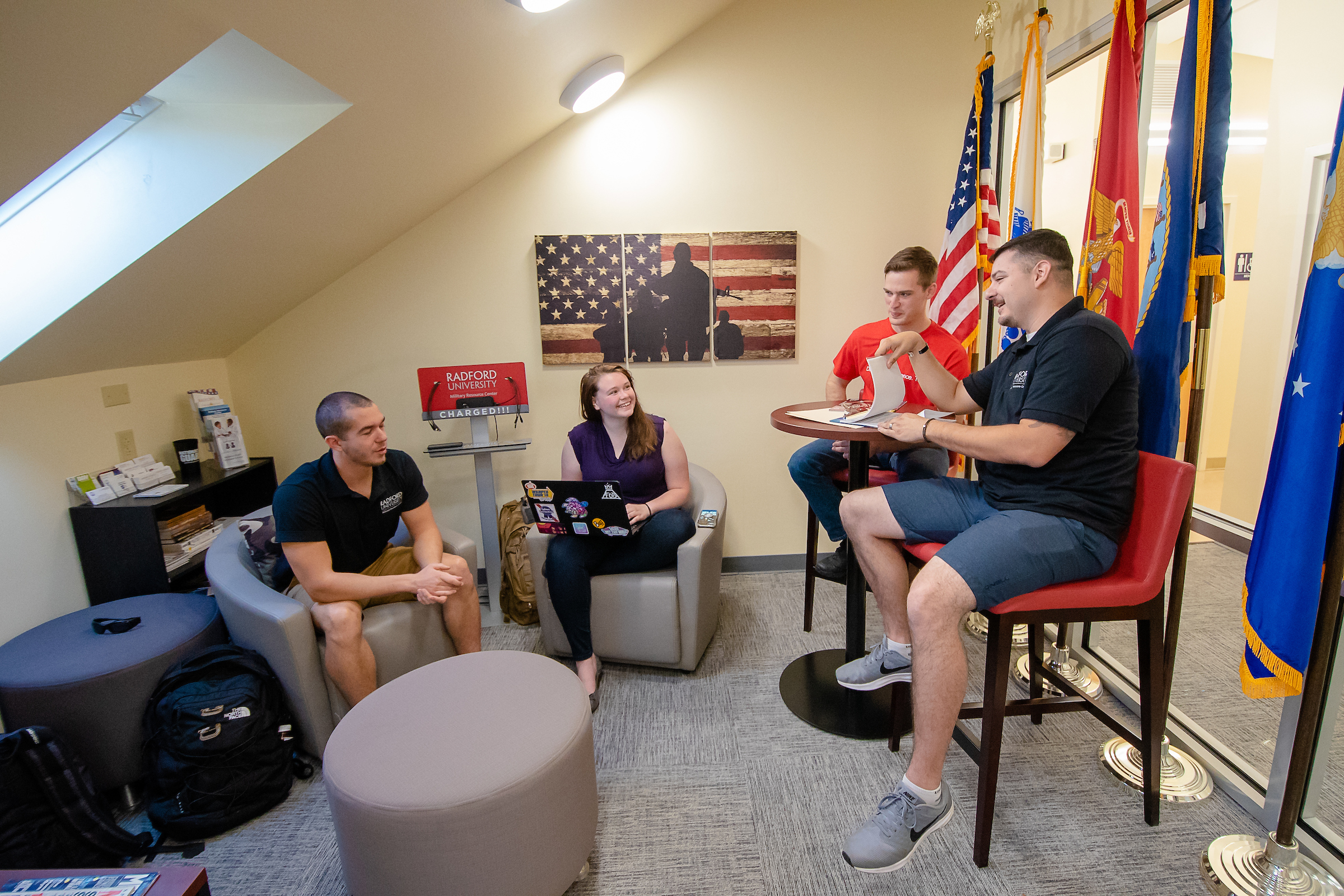
8 minute read
Rad Welcome: Students Have An Array Of Ammenities To Help Them Find Academic Success
In the grand scheme of things, it wasn’t all that long ago that newcomers to colleges across the nation arrived on day one with little more than information packets, a promise of orientation sessions and a photocopy of a campus map to carry along with their loads of luggage, mini-fridges and box fans.
In recent decades, however, the new student experience has advanced at a rapid rate, and Radford University sets a standard at first facilitating smooth entrances for its students, then cultivating positive environments in which they can study and learn, grow and thrive.
Highlander Days, held in March and April, allow admitted students opportunities to apply for financial aid, activate their accounts and complete housing applications and other preliminary forms.
Radford’s summertime orientation program, Quest, gives incoming freshmen, transfers and their families early exposure to the university. They have opportunities to ask questions, learn their way around campus and get to know student leaders, faculty and other Highlanders. Last summer alone, 2,100 freshman and transfer students attended Quest, along with more than 2,700 family members and supporters between June and July.
Move-in has evolved into a fully streamlined process that utilizes staggered arrivals, university teamwork and careful organization to greatly reduce lines, congestion and parking issues.
But there are additional accommodations that extend well into the students’ academic careers, through such options as the Tartan Transfer program, living-learning programs (LLPs), and, for veterans, the Military Resource Center (MRC).
Tartan Transfer
Launched in the fall of 2024, Tartan Transfer is an interface between Radford University and eight regional schools within the Virginia Community College System (VCCS): Mountain Empire, Mountain Gateway, New River, Patrick & Henry, Southwest Virginia, Virginia Highlands, Virginia Western and Wytheville.
This program streamlines the transfer process for community college students coming into Radford to earn their bachelor’s degrees. It improves educational affordability; maximizes the number of credits carried over; offers personalized academic advising plus career preparation through internship opportunities; and gives newcomers early access to events and activities on campus.

It arrived on the heels of Radford’s Tuition Promise, which began this academic year and provides qualifying students with federal, state and gift aid that will cover their tuition costs. That offer is available to incoming freshmen and transfer students with Virginia residency whose families have an adjusted gross income (AGI) of $100,000 or less according to their federal income tax and a Student Aid Index (SAI) of less than 15,000 as determined by the FAFSA.
“That’s a big motivator for a lot of our students, especially at community colleges,” said Radford University’s Chris Bradbury ’12, M.F.A. ’24, who coordinates Tartan Transfer. “Any student that meets those requirements can get it, but it’s something that’s very appealing to our transfer students.”
Most of those inquiring about Tartan Transfer are community college students currently in the process of getting their associate degree, and Bradbury is able to advise potential students on taking the leap to Radford, but he also said he can help those who may be about to enter the community college system with the intent of transferring to Radford afterward.
“I would work with them from day one to help them pick their classes there, and then once they finish everything at the community college level, I would work with them on the transfer process here as well,” he explained.
“I’m able to answer questions about any and all of the more than 70 programs we offer,” Bradbury added. “If they have a question about it, I can answer.”
Living-learning programs
Once students begin their academic careers, Radford offers numerous living-learning programs (LLPs) in fields that include criminal justice, arts, entrepreneurship, nursing and science. Those who take part in LLPs have been shown to have more positive collegiate experiences, both educationally and socially.
Aspiring teachers, for example, have the option of participating in the Schoolhouse LLP. That community currently consists of about 110 students, roughly half of whom reside and work in the Schoolhouse’s living spaces on the third floor of Moffett Hall.
Schoolhouse opened in 2018 and, for the past three years, has been overseen by assistant professor and program coordinator Brian Kitts ’06, Ed.D. ’22.
“I serve as the faculty liaison, along with Drs. Carol Bland ’09, Melissa Lisanti and Wendy Eckenrod-Green, in the College of Education and Human Development. As the students transition to college, my role is to serve as their key contact point,” Kitts explained, adding that those interested in the program get early exposure to it during Highlander Days and Quest: “We actually take prospective students in to meet those who are already living in the Schoolhouse.”

Those introductions can ultimately offer valuable resources to new arrivals.
“It’s not like dropping someone off cold at college, where you don’t know anybody in the community. Our programming is opt-in, so students can pick and choose what they would like to participate in or skip,” Kitts said.
One of the Schoolhouse students, Lillie Ruble ’24, of Abingdon, Virginia, earned her Bachelor of Science in Interdisciplinary Studies and will complete her Master of Science in Special Education in 2025. The daughter of a math teacher, she has been on track to become an educator since middle school and plans to teach special education at the K-12 level. She participated in the Schoolhouse program and lived in Moffett Hall her freshman and sophomore years.
“Coming into Radford, I only knew, like, one or two people from my high school, so it was really nice,” Ruble recalled. “Since we were all in education, we all had similar interests. We could knock on each other’s doors and be able to work together. It’s a lot easier to collaborate that way, especially with group projects. You just go across the hall.”
Kitts said that’s part of the plan: “We have very few kids that struggle with roommates or need room changes or leave altogether. It just doesn’t happen because it’s a really strong sense of community.
“It’s a great precursor to what they’re going to be doing, for those who stay in education for the rest of their lives, and it gives them opportunity to see how they can build that community and grow, and how it can enhance them, and then they get a chance to pass the torch.”
Recent elementary education graduate, Maddie Canterbury ’25 worked as a third-grade student teacher in Roanoke and has already been accepted into Radford’s master’s program in curriculum and instruction.
Canterbury, from Warrenton, Virginia, didn’t learn about the Schoolhouse until she’d already moved into the honors dorm her freshman year, but she remains active in the group despite not living directly within the program.
When she first heard about it, she asked its members about the application process for it.
“And they’re like, ‘No, just come on, right now, we have something going on tonight,’” she recalled. “I went and got to talk to Dr. Kitts and just fell in love with the environment they’re building there. I’ve met some of my best friends from being inside it, and it’s been really beneficial when thinking about classes or trying to do projects. It’s just a really cool inner network that I will always have.”
Military Resource Center
Those transitioning from the armed services to student life can rely on Radford’s Military Resource Center (MRC), which supports the academic efforts of student veterans, active military and reserve members and their dependents. The center offers vets assistance in applying for admission, taking advantage of G.I. Bill benefits, scholarship opportunities and financial aid and obtaining solid academic advice.
While shifting from military life to academia may offer more day-to-day freedom, it also requires a considerable degree of personal initiative.

Before coming to Radford, Frank Fleming ’24 spent seven years in the Army National Guard and emerged as a sergeant. When he entered Radford University, he took a job with the MRC, advising other veterans on both the main campus and in Roanoke.
“I would identify new students who were either veterans or dependents of veterans and help them get connected,” Fleming said. “I would call them or email them and make sure they understand their benefits and the processes. If they’d been accepted, I would offer to meet with them and connect them with whomever they needed on campus.
“Most of the questions I got from existing students were about scholarships, and I helped a couple of students apply, and every student I helped got it. I worked with them from start to finish on their applications.”
Fleming graduated in December 2024 from Radford University Carilion’s physician assistant program and, this spring, began working in primary care serving the Department of Veterans Affairs.
“The MRC is a valuable resource,” he said. “It’s a small group of students from all of the services, and there’s a place for them no matter which campus they’re on.
“They just need to walk in the door and get connected.”










